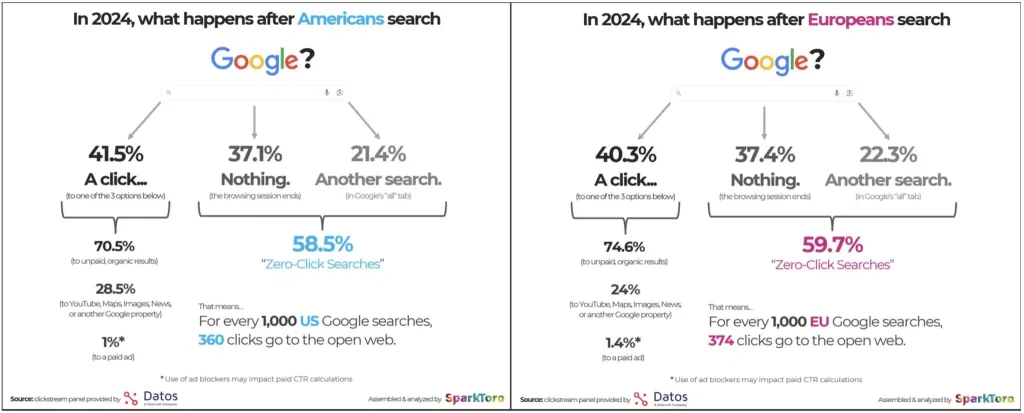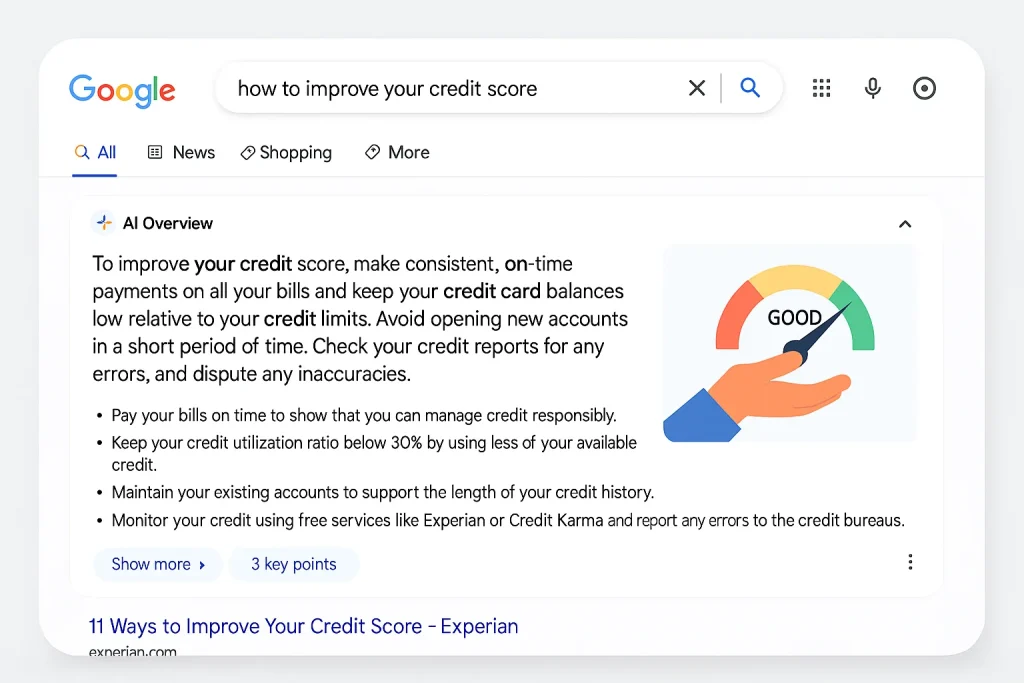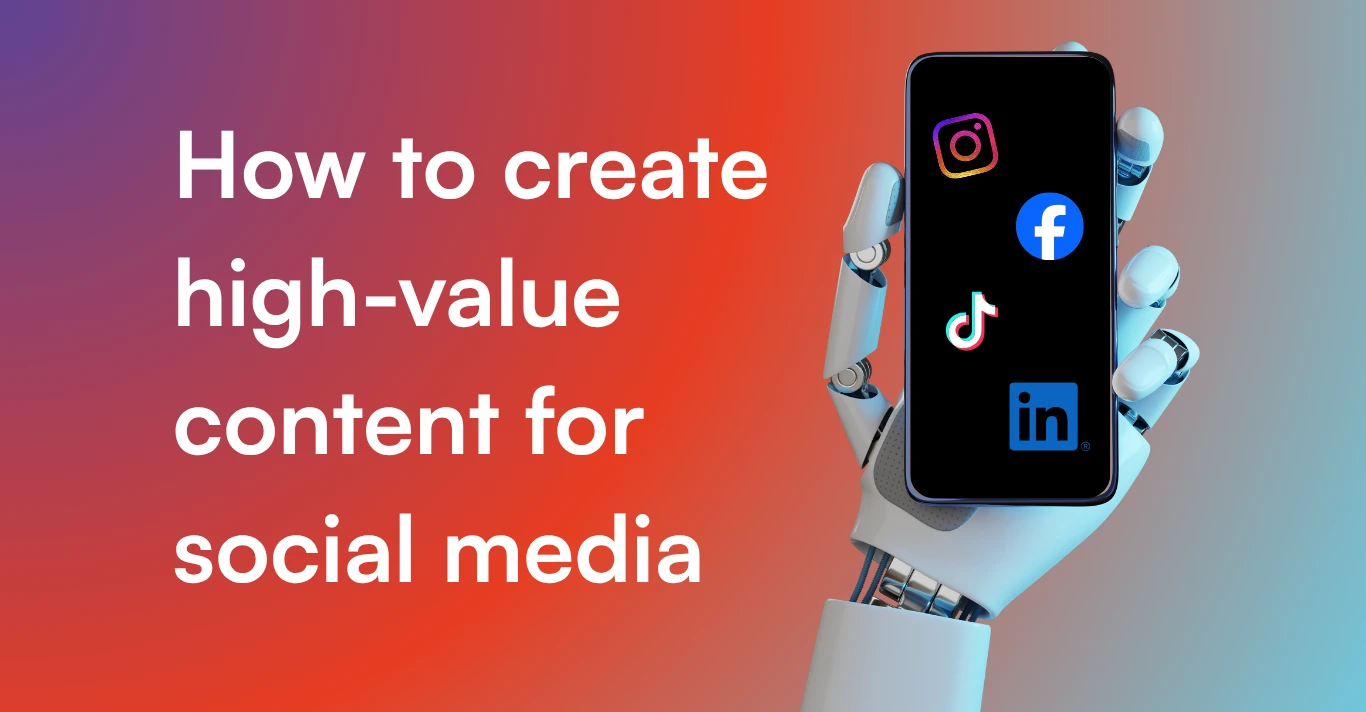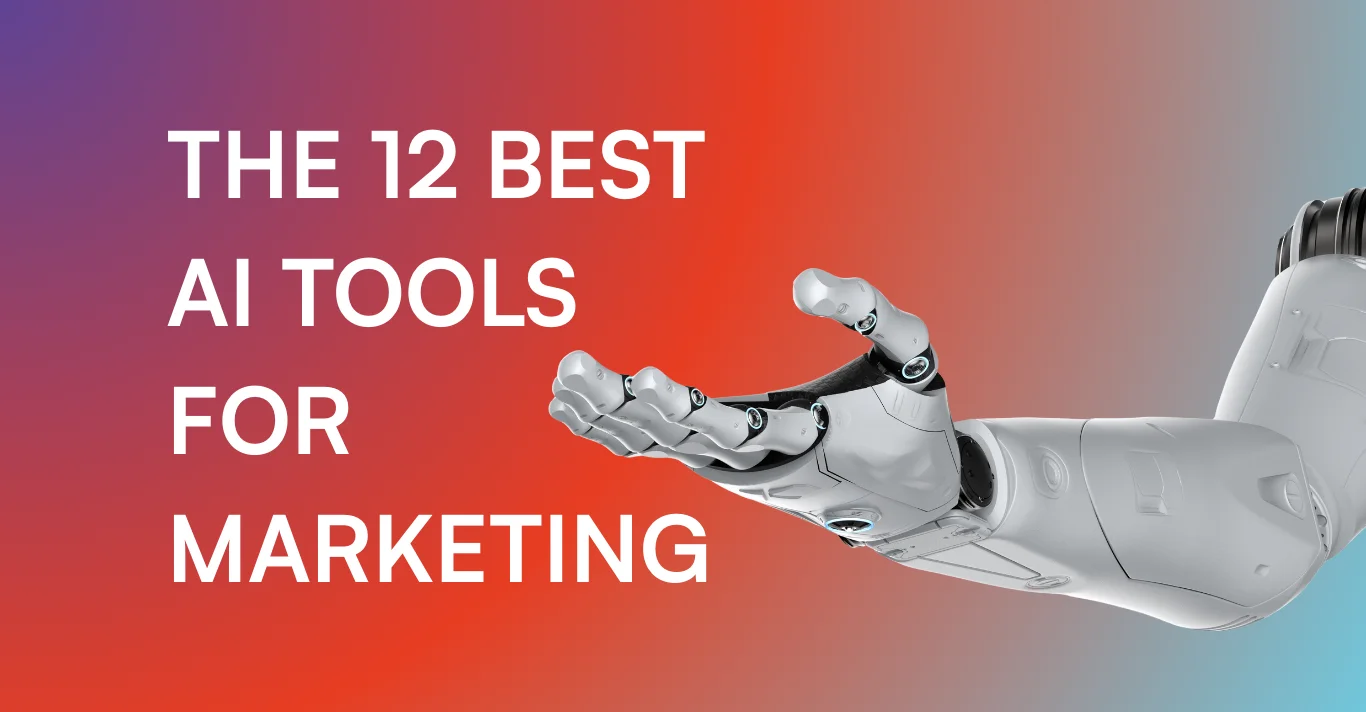Table of Contents
In 2025, zero-click searches are no longer an exception, they’re the norm. With AI-powered search engines like Google’s SGE and Bing Copilot delivering answers directly in the SERPs, fewer users click through to websites.
This shift means marketers and SEOs must rethink their strategies: from optimizing for featured snippets and AI overviews to building brand visibility beyond traditional rankings.
In this guide, you’ll learn exactly what zero-click searches are, why they’ve exploded in the AI era, and, most importantly, how to still win traffic and conversions in a search landscape where clicks are harder to earn.
What are Zero-Click Searches?
A zero-click search happens when a user enters a query into a search engine but doesn’t click any of the results, because they already found the answer directly on the search results page (SERP).
In 2025, this is being fueled by the rise of AI‑powered search experiences like Google’s Search Generative Experience (SGE) and Bing Copilot, which combine data from multiple sources into one instant, highly visual response.
This behavior has been around for years with featured snippets, knowledge panels, and instant answers, but in 2025 it’s being supercharged by AI-powered search experiences like Google’s Search Generative Experience (SGE) and Bing Copilot.
These AI-driven interfaces synthesize answers from multiple sources and present them in a conversational, highly visual format, eliminating the need for the user to visit the original websites.
From a user’s perspective, zero-click searches are faster and more convenient. But for SEOs and marketers, they represent a significant loss of organic clicks , forcing brands to rethink how they capture attention and drive traffic in a world where the SERP itself has become the destination.
Common examples of zero-click searches
- Checking the weather (“weather in New York”)
- Converting units or currencies (“10 USD in EUR”)
- Quick facts (“capital of Japan”)
- Direct definitions (“SEO meaning”)
- AI overviews that summarize multiple pages into one answer
Go deeper: Generative Engine Optimization (GEO): what you should know
The rise of Zero-Click Searches
What started with simple answer boxes and featured snippets has evolved into AI-generated results that dominate the SERP in 2025.
Google’s Search Generative Experience (SGE), Bing Copilot, and other AI search tools now provide rich, multi-paragraph responses, complete with images, product recommendations, and interactive elements—without requiring a single click.
Several factors are driving this surge:
- AI as the primary answer engine – Search platforms now synthesize information from multiple sources into a single, authoritative response.
- User preference for speed – People want instant answers without scrolling through multiple pages.
- SERP real estate changes – Organic listings are being pushed further down by AI panels, ads, and interactive widgets.
- Mobile-first habits – On smaller screens, AI answers occupy the most valuable space, leaving fewer visible organic results.
The challenge for SEOs in 2025 is clear: adapt to the AI-powered SERP or risk invisibility. Winning in this environment requires more than ranking—it means becoming part of the answer that AI delivers.
Zero‑Click Searches rates
Between 2024 and 2025, the average zero-click search rate has increased to 60%.

Key statistics from 2024–2025:
- In 2024, about 58.5% of U.S. searches and 59.7% of EU searches ended without any click to another site (Search Engine Land, SparkToro).
- That means that out of every 1,000 searches in the U.S., only 360 clicks go to the open web; in the EU, only 374 clicks do.
- A 2025 SEO Bazooka report confirms that around 60% of all searches no longer generate external clicks (SEO Bazooka). On mobile, this figure can reach 77%, compared to about 47% on desktop (Up & Social).
Recent trends (2024 → March 2025):
- In March 2025, 27.2% of U.S. Google searches ended without a click—up from 24.4% in March 2024.
- In the EU/UK, zero-click searches rose from 23.6% to 26.1% over the same period (Search Engine Land).
- Organic click-through rates (CTR) dropped to 40.3% in the U.S. and 43.5% in the EU/UK, while clicks to Google-owned properties (YouTube, Maps, etc.) increased to 14.3% in the U.S. and 12.6% in the EU/UK.
Projections:
- Analysts estimate that by the end of 2025, over 70% of searches could result in no external click, largely due to the growth of AI-powered answers.
- The share of queries triggering AI Overviews (Google’s AI-generated summaries) jumped from 6.49% in January 2025 to 13.14% in March 2025, further impacting organic CTR (SEMrush).
Factors that drive Zero‑Click Searches
1. AI‑Generated Answers

AI overviews deliver rich, conversational summaries that satisfy most user queries on the SERP itself, especially for informational and how‑to searches.
2. Featured Snippets and knowledge panels
Google highlights definitions, facts, and quick answers at the very top of the results, pulling information directly from indexed pages.
3. Instant tools and widgets
Built‑in SERP tools—like calculators, currency converters, weather forecasts, and time zone displays—remove the need to click through.
4. Mobile‑First search design
On smaller screens, AI panels and snippets dominate above‑the‑fold space, pushing organic links further down and reducing click probability.
5. Voice search and assistants
Searches via Alexa, Siri, or Google Assistant typically return a single spoken answer with no link to click, further increasing zero‑click behavior.
Why Zero‑Click Searches matter for your SEO strategy
Zero-click searches matter for your SEO strategy because they are a structural shift in how people find and consume information online.
In 2025, with AI overviews, knowledge panels, featured snippets, and other SERP features dominating above-the-fold real estate, getting the click is harder than ever.
Here’s why this matters for your SEO:
- Less traffic, more competition – Even if you rank #1 organically, AI summaries and rich SERP features can steal your visibility and clicks.
- Brand exposure in the SERP is now critical – Your audience may see your brand name in an AI-generated response or snippet without visiting your site. That “impression” can influence trust and brand recall.
- Shift in performance metrics – Traditional SEO KPIs like CTR and organic sessions are declining. Engagement, branded search volume, and assisted conversions become more important indicators of success.
- Content formatting matters more than ever – Structured data, concise answers, and clear topical authority increase the chances of your content being pulled into AI answers or featured snippets.
- Mobile impact is severe – On mobile devices, AI results and zero-click answers dominate the screen, pushing organic listings even further down.
SEO in 2025 is no longer just about ranking high—it’s about earning your place inside the answer. That means creating content designed for SERP features and AI overviews while still driving users to click through when they need deeper information, tools, or solutions only your site can provide.
Go deeper: Why content is important for SEO or Updating old content: the key to SEO sucess
How to optimize for Zero‑Click Searches in 2025
Winning in an AI‑powered, zero‑click search world means adapting your SEO strategy to prioritize in‑SERP visibility and brand authority. Instead of focusing solely on clicks, you must ensure your content becomes part of the answer that Google, Bing, or other AI‑driven platforms display.
Target Featured Snippets & AI Overviews
- Identify snippets‑friendly keywords: Look for queries starting with what, how, why, when, and other informational intents.
- Provide concise, structured answers: Place the direct answer in the first 40–60 words, then expand with more detail.
- Use lists, tables, and step‑by‑step formats—AI loves structured content.
Strengthen Your Topical Authority
- Cover topics comprehensively with cluster content linking back to a main “pillar” page.
- Demonstrate E‑E‑A‑T (Experience, Expertise, Authoritativeness, Trustworthiness) with expert bylines, updated references, and clear sourcing.
Optimize for Branded Visibility
- Ensure your brand name appears alongside high‑value keywords in headings, meta titles, and content.
- Publish unique data, research, or insights that get cited by other sites—and by AI summaries.
Implement & Refine Structured Data
- Add schema markup for FAQs, How‑To, Product, Review, and Organization.
- Keep schema error‑free to maximize eligibility for rich results and AI extraction.
Create Content That Demands a Click
- Offer tools, calculators, quizzes, or interactive experiences AI can’t replicate.
- Include in‑depth analysis, visuals, and downloadable resources that go beyond what’s displayed in the SERP.
Monitor Zero‑Click Impact
- Track changes in impressions vs. clicks using Google Search Console.
- Watch for AI Overview triggers on your target keywords and adapt content accordingly.
Go deeper: How to rank on ChatGPT: 6 powerful strategies
Conclusion & key takeaways
Zero‑click searches are no longer a fringe phenomenon—they are the default search experience in 2025. With AI‑powered results, featured snippets, and rich SERP features absorbing more user attention, the way we approach SEO must evolve.
Key takeaways for marketers and SEOs:
- Visibility is the new currency – Being present in AI Overviews, snippets, and other SERP features is just as important as traditional rankings.
- Optimize for answers, not just keywords – Structure your content so it can be pulled directly into AI responses while still encouraging users to click for deeper value.
- Shift your metrics – CTR and sessions matter less if your brand dominates in‑SERP presence and drives brand recall.
- Leverage assets AI can’t replicate – Interactive tools, proprietary data, and gated resources can draw clicks even when AI answers dominate.
- Play the long game – Consistent topical authority and brand recognition will position you to win in a landscape where Google and Bing aim to keep users in their ecosystems.
FAQs
Yes, zero-click searches are increasing, and this trend is reshaping the landscape of SEO, user behavior, and digital marketing strategies.
As of 2025, estimates show that between 57% and 60% of Google searches are zero‑click — meaning the user does not click on any result after performing the search.
- Definitions
- Math calculation
- Sports scores
- Currency conversion


